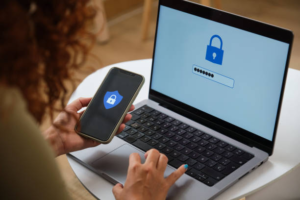INTREDITATION
In terms of cryptocurrencies, security rules everything. Unlike conventional banking, in which banks offer layers of safety, secure management of your cryptocurrencies lies totally under your control. This implies that recovery choices are either few or nonexistent should your crypto assets be compromised. This book addresses the most important safety advice to help you protect your bitcoin, therefore ensuring that you keep one step ahead of scammers and hackers.
WHY CRYPTO SECURITY ENDERS
Growing popularity of cryptocurrencies also makes them more appealing target for hackers and frauds. Phishing schemes, account breaches, and dangerous malware have cost several customers their money recently. Knowing the fundamental actions to safeguard your cryptocurrency will help you to safeguard your assets and prevent being a victim of usual hazards.
APPLY STRONG, UNIQUE PASSWORDS
Whether it’s on an exchange or a digital wallet, always choose a strong, unique password when configuring any account linked to your cryptocurrency. At least 12 characters long and combining uppercase and lowercase letters, numbers, and symbols, a strong password is Steer clear of using passwords across several sites or platforms. Safely tracking several complicated passwords is made possible by using a password manager.
ENABLE TWO-FACTUAL AUTHENTICATION (2FA)
By mandating a second type of verification outside of simply your password, two-factor authentication (2FA) adds a degree of protection.

Usually, 2FA entails entering a code created by an authenticator app, such Google Authenticator, provided to your mobile device. This implies that even if someone manages to obtain your password, they won’t be able to access your account without this auxiliary form of validation.
BE WARY WITH PHISHING SCHEDULE
One often used tactic by hackers to access your bitcoin accounts is phishing scams. Usually including bogus emails, texts, or websites seeming exactly like genuine services, phishing fools you into typing your login information. Never click on links in unsolicited emails or texts; always double-check the URL and search for minor misspellings or deviations. Mark the official exchange and wallet sites to stop inadvertent access to phoney websites.
AVOID PUBLIC WIFI FOR TRANSACTIONS
Usually less secure public Wi-Fi networks make it simpler for hackers to intercept data. Avoid completely using public Wi-Fi when accessing your crypto accounts. If you have to utilize public Wi-Fi, think about encrypting your internet connection by adding a virtual private network (VPN).
GET A SECURE WALLET
Maintaining the security of your cryptocurrency depends critically on the wallet you use. Each of the numerous kinds of wallets has different degree of security:
- Hot Wallets: Convenient for fast transactions, hot wallets link to the internet. Still, they are more susceptible to cyber assaults.

- Cold Wallets: Cold wallets are offline devices—hardware wallets, for example—that are far more difficult to breach. For longer term storage of more volume, they are perfect. Your needs will determine which wallet is ideal for you; but, if security is your first concern, cold wallets are usually safer.
GIVE COLD STORAGE SOME THOUGHT
Cold storage is especially advised for people intending long-term investments or who own significant quantities of cryptocurrencies. Keeping your cryptocurrency offline—that is, in a hardware wallet or even a piece of paper (paper wallet)—that stores your private keys—is known as cold storage. Cold storage is almost impervious to hacking efforts since it is cut off from the internet.
MAINTAIN CURRENT WITH YOUR SOFTWARE
Always maintain your software current whether it’s for your wallet, exchange, or any gadget where you access crypto. Many times, software upgrades feature security fixes meant to guard against fresh vulnerabilities. Keeping current with upgrades helps you to guarantee that your crypto assets are safe against recognized risks.
WATCH YOUR ACCOUNTS REGULARLY
Regularly reviewing your crypto accounts is crucial for spotting any unusual behavior. Signs of illegal access could include unusual purchases, unidentifiable log-in or email concerning account modifications. Keeping an eye on your accounts can help you to respond right away should something seem unusual, such as password changes and client support contact.
END NOTES
Getting your cryptocurrencies calls for proactive strategy. Following these basic guidelines can help you greatly lower your chance of losing your valuables to hackers: from choosing strong passwords and enabling 2FA to being wary of phishing efforts and utilizing safe wallets. Control your crypto security right now to enable confident trading and investment.
